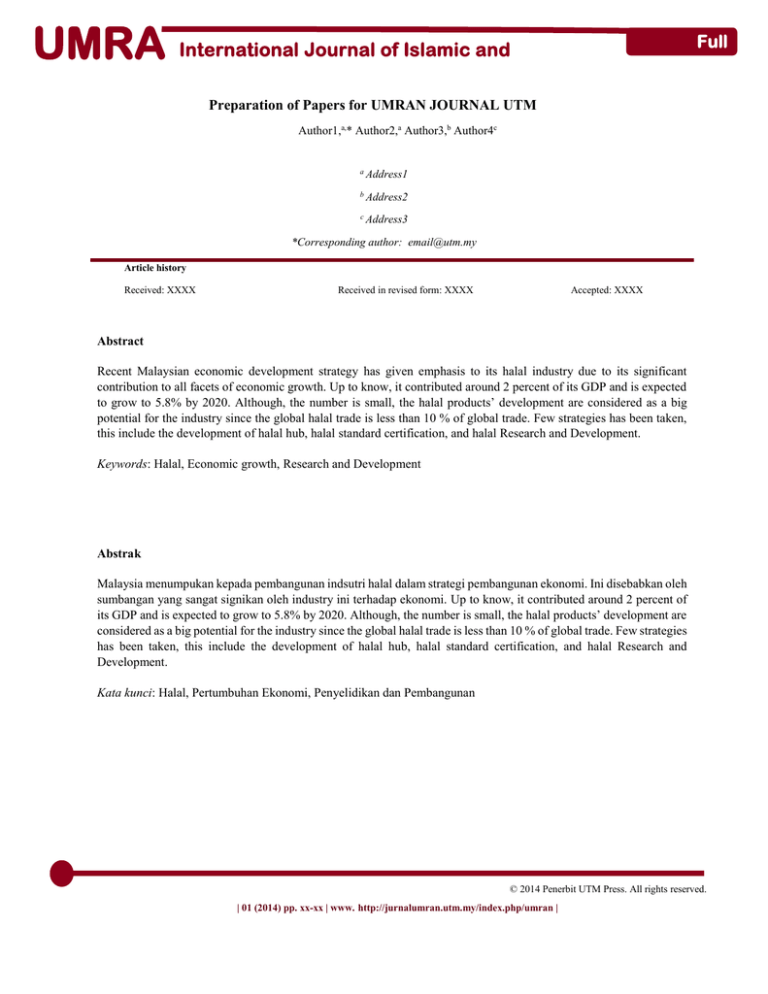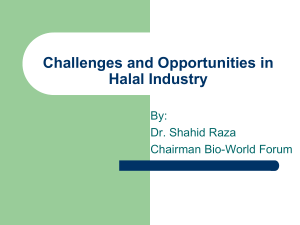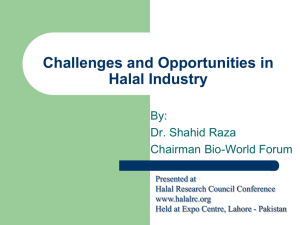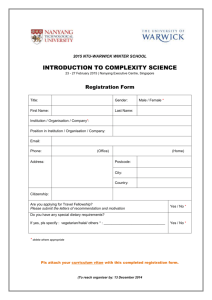
UMRA
N
Full
Paper
International Journal of Islamic and
Civilizational Studies
Preparation of Papers for UMRAN JOURNAL UTM
Author1,a,* Author2,a Author3,b Author4c
a Address1
b Address2
c Address3
*Corresponding author: email@utm.my
Article history
Received: XXXX
Received in revised form: XXXX
Accepted: XXXX
Abstract
Recent Malaysian economic development strategy has given emphasis to its halal industry due to its significant
contribution to all facets of economic growth. Up to know, it contributed around 2 percent of its GDP and is expected
to grow to 5.8% by 2020. Although, the number is small, the halal products’ development are considered as a big
potential for the industry since the global halal trade is less than 10 % of global trade. Few strategies has been taken,
this include the development of halal hub, halal standard certification, and halal Research and Development.
Keywords: Halal, Economic growth, Research and Development
Abstrak
Malaysia menumpukan kepada pembangunan indsutri halal dalam strategi pembangunan ekonomi. Ini disebabkan oleh
sumbangan yang sangat signikan oleh industry ini terhadap ekonomi. Up to know, it contributed around 2 percent of
its GDP and is expected to grow to 5.8% by 2020. Although, the number is small, the halal products’ development are
considered as a big potential for the industry since the global halal trade is less than 10 % of global trade. Few strategies
has been taken, this include the development of halal hub, halal standard certification, and halal Research and
Development.
Kata kunci: Halal, Pertumbuhan Ekonomi, Penyelidikan dan Pembangunan
© 2014 Penerbit UTM Press. All rights reserved.
| 01 (2014) pp. xx-xx | www. http://jurnalumran.utm.my/index.php/umran |
Author et al. / UMRAN – International Journal of Islamic and Civilizational Studies. xx (20xx) pp–pp
1.0
INTRODUCTION
Halal industry has now become an important sector for Malaysian economy in developing and
promoting its economy. This can be seen through government’s commitment in tapping this new emerging
sector. This is due to the industry significant contribution to all facets of economic growth. Recent data
showed that halal industry contributed around 2 percent of Malaysian GDP and is expected to grow to 5.8%
by 2020. Although, the number is small, the halal products’ development are considered as a big potential
for the industry since the global halal trade is less than 10 % of global trade.
Despite the fact that the concept of halal in Islam is not new as it has been stated in the Quran since
1400 ago, halal issue has been a sensitive issue that raised concern among Muslim in Malaysia. This is due
to low level of sensitiveness of most of the producers in producing the so called halal products. Moreover
most of the foods and materials imported from outside are not assured as halal. This concern has triggered
Malaysian government through Islamic Development Department (JAKIM) to take this seriously and
develop an assurance system to make sure products cosumed by the Muslims whether they are imported or
produced locally are certified as halal and followed Malaysian halal standard.
Malaysia’s commitment in empowering this new sector is emphasized in it National Policy, whereby,
in Third Industrial Master Plan (IMP3) and National Agricultural Policy specifically mentioned that
Malaysia set a target to increase halal food productions and in the meantime strengthen halal products’
competitiveness in the global level. Given the fact that Malaysia is considered a modern Islamic country
and strong economic background with well-developed physical and institutional infrastructure, Malaysian
government believe that this could boost country’s commitment in develop and promote this industry. On
the other hand, huge demands from domestic and international consumers also contribute to the Malaysia’s
eagerness in promoting this new emerging business in Islamic world.
Despite the commitment shown and strategy implemented by Malaysian Government, the achievement
is questionable? The development of halal industry also raised few questions in developing Islamic
business. Whether, Muslim in Malaysia is really capable economically and politically in delivering this
great agenda not only for Malaysia as a country but for the Muslim in the South East Asian region and
Malaysia in particular. Therefore, in this paper, it is argued that the development of halal industry have
been taken advantage by non-Muslim producers rather than Muslim, although it has significant contribution
to the Muslim consumers. In this paper, we will also discuss further step that can be taken and will be taken
by various level of Institutions including the academia.
2.0
HALAL ISSUE 1
Halal, is an arabic/Quranic term which means “permissible” or “allowed” and it is confined in various
aspect of Muslim life whether it is muamalah practices or activities that relates to ibadah etc. However, in
the Muslim majority, the concept of halal refers to Muslim daily consumption that includes food, medicine,
pharmaceutical etc. In defining halal term in accordance to Islamic teaching and Islamic law, all issues
concerning halal or haram and even all disputes should be referred to Quran and Sunnah (prophetic
tradition) (Doi, 2007).
Although, getting halal foods seems not a major issue for country that has highest population of
Muslims, problem occurs when significant numbers of processed food, medicine etc are imported from
abroad. In some countries where Muslim are minorities or even slightly more than 50 percent, Muslims
began to rely upon non-halal certified products, particularly meats and processed food, since halal
certification had been virtually non-existent (Chaudry, Jackson, Hussaini, & Riaz, 2000). In fact, Muslim
community had no formal established infrastructure and system to monitor the halal authentication.
Nevertheless, recent development shows that, numbers of Muslim countries has developed their own
Page | 2
Author et al. / UMRAN – International Journal of Islamic and Civilizational Studies. xx (20xx) pp–pp
standard and system in certifying products halalness. Prior to this, degree of Muslims concerns towards the
food that they consume was very high.
Halal certification refers to the examination of food processes in its preparation, slaughtering, and
cleaning, processing, handling, disinfecting, storing, transportation and management practices. The
application of halal should apply to all stages of processing "from farm to table" (Yusoff, 2004). Thus it is
argued that, by having halal certification, it would gain consumer confidence, create competitive advantage,
bring quality to the consumer provides a mechanism to audit and monitor halal products especially food
products. The process can be seen in Figure 1.
In Malaysia, beginning in 1975, issues pertaining halal products start to be discussed when the
government established Trade Description Act regarding the halal matter in 1975. From that moment the
government through the Department of Islamic Development Malaysia (JAKIM) issued a halal validation
letter to products that meet Syariah requirement. The halal assurance system evolved, and in 2003, the
government has streamlined the implementation of halal certification and the Department of Islamic
Development Malaysia (JAKIM), is given sole authority in the conferment of the halal certificates and
labels at both the federal and state level.
3.0
HALAL ISSUE 2/METHODOLOGY
This study employs several methods in gathering all related information pertaining to halal industry.
Interview surveys were conducted and questionnaire surveys were also distributed among selected
respondents in Johor district. Among the sample were Muslim entrepreneurs and non-Muslim
entrepreneurs. Respondent were randomly selected in order to assure this study is unbiased.
AS suggested by:
Research in halal issues has also been a focus for University Science Malaysia. As a
science based university, issues related to food sciences, food materials, pharmaceutical
and nutraceutical products are the main focus to the scientist in this University to
investigate and examine.
4.0
HALAL ISSUE 3/RESULTS AND ANALYSIS
Table 1 shows that, awareness among Muslim is considerably high. Beginning in 1975, issues
pertaining halal products start to be discussed when the government established Trade Description Act
regarding the halal matter in 1975. From that moment the government through the Department of Islamic
Development Malaysia (JAKIM) issued a halal validation letter to products that meet Syariah requirement.
The halal assurance system evolved, and in 2003, the government has streamlined the implementation of
halal certification and the Department of Islamic Development Malaysia (JAKIM), is given sole authority
in the conferment of the halal certificates and labels at both the federal and state level.
Table 1: Score of Awareness among Muslim entrepreneurs
Issues
Level
Score
Awareness 1
60%
80
Awareness 1
20%
90
Page | 3
Author et al. / UMRAN – International Journal of Islamic and Civilizational Studies. xx (20xx) pp–pp
This indicates that, halal awareness among Muslim entrepreneurs is considerably high. Further
analysis is done as follow.
4.1
ISSUES ON AWARENESS
The halal assurance system evolved, and in 2003, the government has streamlined the implementation
of halal certification and the Department of Islamic Development Malaysia (JAKIM), is given sole authority
in the conferment of the halal certificates and labels at both the federal and state level
4.1.1
AWARENESS DEFINITION
It can be defined as:
1. Awareness I
2. Awareness II
3. Awareness III
5.0
DISCUSSION AND RECOMMENDATION
The most outstanding contribution in researches and developments of halal industry by the Academic
institution in Malaysia is lead by Halal Product Research Institute of University Putra Malaysia, whereby
the institute “serves as a one-stop centre approach through a comprehensive, balanced and multifaceted to
study all aspects of halal products in national and global levels”. The institute focuses on the research of
halal products and in particular developing the field of agriculture. Among the remarkable achievement of
this institute is its ability to develop pork’s DNA detection kit which helps a manufacturer and authorities
to assure “halalness” of food products.
Research in halal issues has also been a focus for University Science Malaysia. As a science based
university, issues related to food sciences, food materials, pharmaceutical and nutraceutical products are
the main focus to the scientist in this University to investigate and examine. The research does not only
limit to this stage, they are also responsible to develop halal alternative raw materials in such products. This
can be seen through its commitment to produce halal collagen, halal gelatine, halal vaccine halal enzyme
and etc (BERNAMA, 22 September 2011; Harian, 2010). Moreover, this university’s expertise in
developing bio-products has also contributed to the halal products development.
6.0
CONCLUSION
This study concludes that, the emergence of halal certification is in tandem with several factors. The
factors include government support, research and development, halal awareness, consumers’ responsibility
and need for proper consumption.
Acknowledgement.
We are grateful for the UTM scholarship to Author 1.
References
BERNAMA. (22 September 2011). USM Receives R&D Sponsorship From Australian Company. Retrieved
10 February 2012, from http://halalfocus.net/2011/09/23/malaysia-usm-receives-rd-sponsorshipfrom-australian-company/
Page | 4
Author et al. / UMRAN – International Journal of Islamic and Civilizational Studies. xx (20xx) pp–pp
Muhammad Munir Chaudry, Mary Anne Jackson, Mohammad Mazhar Hussaini, & Mian Nadeem Riaz.
(2000). Halal Industrial Production Standards., (4th ed.). Illinois, USA: J&M Food Products
Company.
Bertia Harian. (2010, 18 February). USM & Finlay Institute collaborate to produce halal vaccine, Berita
Harian.
Hakimah Mohd. Yusoff. (2004, July - August). Halal Certification Scheme. Standard & Quality News, Vol.
11, Shah Alam: SIRIM Berhad, 4-5.
Page | 5




